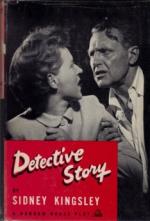|
This section contains 351 words (approx. 1 page at 400 words per page) |

|
Detective Story Summary & Study Guide Description
Detective Story Summary & Study Guide includes comprehensive information and analysis to help you understand the book. This study guide contains the following sections:
This detailed literature summary also contains Bibliography on Detective Story by Sidney Kingsley.
Sidney Kingsley's play Detective Story was a critical and popular success during its time, garnering the 1949 Edgar Allan Poe Award and a successful run on Broadway. Detective Story was adapted to the screen as a major motion picture starring Kirk Douglas and became a prototype for later movie and television police crime dramas.
Detective Story centers on the decisions of James McLeod, a New York City police detective who self-righteously regards himself as a sovereign judge of the rights and wrongs of others. McLeod performs his job with complete disregard for the rights of the accused and the laws of due process in the American justice system. He brutalizes Kurt Schneider, a man who has turned himself in to the police due to an arrest warrant, under suspicion of performing illegal abortions. McLeod is convinced that Schneider is guilty and disregards the legal process by which the man has the right to a fair trial in order to determine his guilt or innocence. When McLeod learns that his own wife once obtained an abortion from Schneider, he is unable to forgive his wife for her past decisions, and his marriage is destroyed. Only in his dying moments, having received a fatal gunshot wound from an already apprehended burglar, does McLeod realize that he himself is guilty of failing to forgive others for their mistakes.
Kingsley wrote Detective Story as a message about the importance of maintaining the rights of the accused and upholding due process in law to the principles of democracy. He was particularly concerned with the threat of a corrupt or totalitarian police force to a free society. In an introduction to Detective Story, Kingsley explained:
When I named my police station the Twenty-First Precinct, I hoped some of the audience might ask themselves whether we will be living in a police state in the twenty-first century, or whether we will be getting the protection of the police in accord with the rules of a free society.
In Detective Story, Kingsley explores themes of forgiveness and compassion, democracy and justice, police brutality, and self-righteousness in judging others.
Read more from the Study Guide
|
This section contains 351 words (approx. 1 page at 400 words per page) |

|



